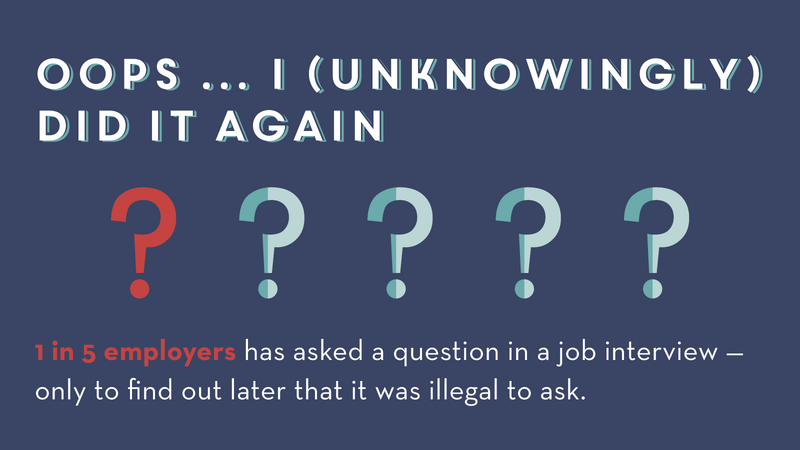5 QUESTIONS TO DEFINITELY AVOID ASKING A CANDIDATE IN INTERVIEW
A quick search on the internet regarding what questions a candidate should and should ask in interview will bring up countless results but it’s not so easy for an interviewer without a CIPD qualification (especially when they have not received adequate training or guidance) to know what should be avoided.
Most interview questions are used to test the ability or potential of a candidate to do the job but others even if asked innocently or a way of breaking the ice or "getting to know you" type questions could indicate discrimination. So, whether an employer is asking about a candidates age or their marital status they are venturing into dangerous territory as these are not legitimate reasons as to why an application should be turned down.
We thought it might be useful to examine some examples of questions we have been notified that came up in interview and why we think are strictly off limits.
-
Are you from the UK/ Is English your first language?
Although employers have a legal obligation to check that applicants are eligible to work in the UK – they have no right to ask any questions regarding race, religion or a native language.
Although many jobs may require employees to speak fluently, none of them will need it to be a first language. If a candidate can speak and write English to the required standard and they can provide proof of legal right to work in the UK, they should be considered.
In fact, implying that nationality would affect the ability to do the job could indicate discrimination.
An alternative: ‘What languages do you fluently write or speak?’
-
Are you married?
Any questions about marital status, children and future family plans should not be asked at an interview.
Not only are these questions of a personal and potentially discriminatory nature, this line of questioning could also be used to determine a person’s sexual orientation – something which has no bearing on a candidate’s ability to do the job.
So, no matter what the context, questions like these should be avoided
What you could ask: ‘Do you have any current commitments which may affect your ability to do this job, or which may impact your attendance?’
-
How old are you?
Although this seems like quite an innocent question on the surface, there are very few reasons an employer needs to ask for a candidates age.
Aside from needing to be over 18 to sell certain products (e.g. alcohol) – age shouldn’t affect the ability to do a job effectively. This means that employers have no right to ask about exact age, or to let it influence the decision to hire.
Some hiring managers sometimes attempt to ask this question subtly – by asking for a date of birth for their records, date of graduation, retirement plans etc but these are similarly controversial.
An employer can only ask a candidate’s date of birth on a separate equality monitoring form – and the person selecting candidates should not be allowed to see this.
-
How many sickness days did you take in your last period of employment?
Whether the employer asks about sickness, health, or disabilities – subjects like these should always be avoided at an interview.
The only time an employer can ask about this is if it’s to establish whether an applicant needs an assessment to determine their suitability for the job, or to determine whether adjustments need to be made in order to accommodate a candidate’s needs (e.g. fitting a disabled toilet).
Once a position has been offered, the employer can make enquiries into health, but only if these relate to the ability to carry out the role effectively.
For more information, you might find this link useful Equality Act (2010).
A better question: ‘Do you have any specific requirements in order to perform this job effectively?’
-
Do you have any previous criminal convictions?
There is no obligation for a candidate to disclose criminal convictions if the sentence has already been spent.
For this reason, an employer should not refuse employment to an individual because of a previous crime, unless it relates to the role in question (for example teacher, childminder, a senior banking or financial role).
Also, it’s worth bearing in mind that criminal records checks are carried out by the Disclosure and Barring Service (DBS) for certain roles (e.g. security related, working with children, healthcare etc.), but this should be undertaken by employers before the interview stage. These were formerly known as CRB checks.
A less hazardous enquiry: ‘Do you know of any reasons why you may not legally be able to take this position?’
Other questions that should not be asked: (some may be more obvious than others)
‘What religion are you?’, ‘what are your sexual preferences?’ ‘are you in debt?’, ‘do you have children?’, ‘do you smoke?’, ‘are you a trade union member?’, and no matter how well the interview is going.......‘Shall we discuss this further over drinks?’
-
Final thoughts………
This is by no means a definitive, but we hope useful list.
If in doubt "leave it out" and remember you should only interview on the ability to do the job. Any questions leading to bias in hiring (e.g. relating to personal life, age or ethnicity) are strictly off limits.
Of course, there are some roles that these factors may directly impact your performance such as acting/modelling and other often classed as occupational requirements, but these are very rare in a commercial setting.
We would be keen to hear your feedback on the above and feel free to let us know the most inappropriate question you have ever heard in an interview.

